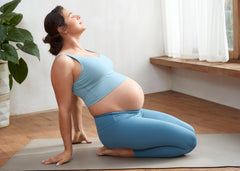Getting good sleep during pregnancy isn’t just a luxury — it’s a must. As your body changes to support a growing baby, sleep patterns often get thrown off. Tossing and turning becomes the norm. You’re either too hot, too uncomfortable, or you need to pee for the fifth time since midnight. But there are real ways to sleep better while pregnant.
Why Sleep Matters More Than Ever in Pregnancy
When you're pregnant, your body is working overtime. Hormones are in overdrive, your blood volume increases, your heart is pumping faster, and your metabolism is shifting gears. That’s a lot. Sleep helps your body recharge, reduces stress, boosts immune function, and supports your baby's growth.
Lack of sleep doesn’t just make you grumpy. It can lead to higher risks of gestational diabetes, preeclampsia, and depression. You might also feel more anxious, forgetful, and emotionally drained. That’s why finding the right way to sleep isn’t just about comfort — it’s about keeping you and your baby safe and balanced.
When you're sleep-deprived during pregnancy, you may also struggle with appetite changes, poor focus, and increased body aches. The bottom line? Your body needs rest more than ever before.
The Best Sleeping Position During Pregnancy
Doctors and specialists all agree on this: the best sleep position during pregnancy is on your left side. This is especially true in the second and third trimesters. Sleeping on your left improves blood flow to the placenta and kidneys, while keeping pressure off your liver.
It may not be your usual go-to sleep position, but it works. Some people find it helpful to wedge a pillow between their knees, or hug a long body pillow to stay balanced. You can even place a small pillow under your belly for extra support or one behind your back to keep you from rolling over during the night.
Avoid sleeping on your back in late pregnancy. That position puts pressure on your inferior vena cava, the vein that returns blood from your lower body to your heart. That can lead to dizziness, shortness of breath, or even low blood pressure. It also reduces blood flow to your uterus and baby, which isn’t ideal for either of you.
How to Deal With Pregnancy Sleep Problems
Let’s be honest: sleep doesn’t come easy during pregnancy. Between your growing belly, frequent urination, leg cramps, and heartburn, nights can feel endless.
1. Build a Wind-Down Routine
Consistency matters. Try to go to bed and wake up at the same time every day. That includes weekends. Your body runs better on routine. Turn off screens about 30 to 60 minutes before sleep. Read something low-stress. Light a lavender candle. Stretch gently. Take deep breaths. Your body needs cues that it’s time to power down.
2. Manage What You Eat and Drink
Late-night meals can trigger heartburn — and that’s a common complaint among pregnant people. Try to avoid heavy, spicy, greasy, or acidic foods in the evening. Stick to smaller portions at night. If hunger strikes before bed, pick a light snack like oatmeal, yogurt, or a banana.
Also, start cutting off fluids 1–2 hours before bed. That helps reduce the number of bathroom trips during the night. But make sure you’re staying hydrated throughout the day.
3. Get Strategic With Pillows
You don’t have to spend a fortune on fancy pregnancy pillows — regular pillows work just fine. Use one between your knees to align your hips. Slide one under your belly for gentle lift. Place another behind your back for support and to stop yourself from rolling onto your back.
If you're struggling with heartburn, prop up your upper body with pillows to sleep slightly elevated. This can reduce acid reflux and help you breathe better.
4. Cool Down Your Space
Pregnancy naturally raises your body temperature. That’s why you might feel sweaty or uncomfortable at night. Set your bedroom temperature between 65–70°F (18–21°C). Use light cotton sheets and a fan if you need one. A cool shower before bed can help lower your body temp and relax your muscles.
Is It Safe to Sleep On Your Right Side?
The left side is ideal, but the right side is still safe. It also promotes circulation and doesn’t carry the same risks as sleeping flat on your back. Many pregnant people naturally shift between both sides — and that’s totally okay. The goal is to avoid back sleeping in the later months.
If you find that your right side is more comfortable, don’t stress. It’s better to sleep well on your right side than to lie awake all night trying to force yourself onto your left.
Pregnancy Insomnia Is Real — Here’s What You Can Do
Pregnancy insomnia affects a lot of women, especially in the third trimester. You might lie awake for hours with racing thoughts, back pain, or just general discomfort. Here’s how to handle it:
Instead of forcing yourself to sleep, get up and leave your bedroom for a bit. Do something relaxing — maybe read a book, sip warm milk, or do light stretching. Keep the lights dim. Avoid your phone or TV. Blue light from screens can trick your brain into staying awake longer.
You can also try deep breathing, pregnancy-safe meditation, or gentle yoga before bed. The goal is to calm your nervous system and train your body to relax.
Should You Take Anything to Help You Sleep?
Some women consider sleep aids or supplements during pregnancy, but not everything is safe. Don’t take any medications — over-the-counter or herbal — unless your doctor says it’s okay.
Some natural options like magnesium, chamomile tea, or melatonin in small doses are sometimes approved by doctors, but again, you must check first. What’s “natural” isn’t always safe during pregnancy.
Try other methods first: warm baths, lower caffeine intake, more physical activity during the day, or prenatal massage. Many times, small changes in your habits lead to big improvements in your sleep.
Final Thoughts
Getting good sleep during pregnancy isn’t always easy — but it is possible. Between your changing body, your emotions, and your baby growing inside you, there’s a lot going on. But your sleep deserves attention. Use the tools that work for you. Try new positions. Create a calm routine. Talk to your doctor when needed.
This is your time to rest, reset, and get ready — one peaceful night at a time.
FAQs
What if I wake up on my back while pregnant?
No need to worry. Just shift back to your side. Your body will usually give you a sign if something’s wrong, like feeling lightheaded or short of breath.
Is sleeping on my stomach okay in early pregnancy?
Yes, it’s generally fine during the first trimester. As your belly grows, though, stomach sleeping becomes uncomfortable and not recommended.
How many hours should a pregnant woman sleep each night?
Aim for 8 to 10 hours of sleep. If you’re still tired during the day, short naps can help recharge your energy safely.





































































